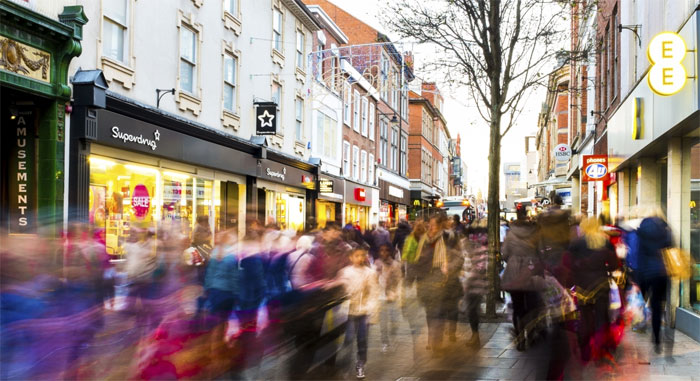
These Companies Are Revolutionising Retail
Retail is changing rapidly, and many industry leaders are realising that they have the choice to either adapt or die.
Amazon is creating the store of the future.
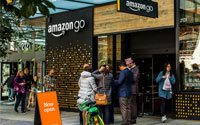 Headquarters: Seattle, Washington
Year founded: 1994
Why it's revolutionary: In January, Amazon opened its first cashierless store, Amazon Go, in Seattle, which promised to create a completely slick shopping environment by using cameras and sensors to enable customers to purchase items without having to go to checkout or wait in line. Shoppers are automatically charged when they leave the store with an item.There are now four of these locations in the US; Amazon reportedly plans to open 3,000 more in the next few years.
Walmart is building an e-commerce arsenal
Headquarters: Seattle, Washington
Year founded: 1994
Why it's revolutionary: In January, Amazon opened its first cashierless store, Amazon Go, in Seattle, which promised to create a completely slick shopping environment by using cameras and sensors to enable customers to purchase items without having to go to checkout or wait in line. Shoppers are automatically charged when they leave the store with an item.There are now four of these locations in the US; Amazon reportedly plans to open 3,000 more in the next few years.
Walmart is building an e-commerce arsenal
 Headquarters: Bentonville, Arkansas
Year founded: 1962
Why it's revolutionary: Walmart has been on an acquisition spree in the past few years, buying up popular e-commerce brands in an effort to woo millennial shoppers. In 2018, these included online lingerie site Bare Necessities, plus-size retailer Eloquii, and Art.com.
According to Walmart, "One of the drivers for customers to continue coming back to your brand is going to be finding products and experiences that they just can't get anywhere else." With these new trendy brands, it hopes to do just that. Walmart's e-commerce president and CEO Marc Lore also said the retail giant needs to acquire 40 to 50 "successful digitally native retailers" in order to "resonate with millennials," so consumers can expect more to follow.
Everlane is turning plastic bottles into winter jackets
Headquarters: Bentonville, Arkansas
Year founded: 1962
Why it's revolutionary: Walmart has been on an acquisition spree in the past few years, buying up popular e-commerce brands in an effort to woo millennial shoppers. In 2018, these included online lingerie site Bare Necessities, plus-size retailer Eloquii, and Art.com.
According to Walmart, "One of the drivers for customers to continue coming back to your brand is going to be finding products and experiences that they just can't get anywhere else." With these new trendy brands, it hopes to do just that. Walmart's e-commerce president and CEO Marc Lore also said the retail giant needs to acquire 40 to 50 "successful digitally native retailers" in order to "resonate with millennials," so consumers can expect more to follow.
Everlane is turning plastic bottles into winter jackets
 Headquarters: San Francisco, California
Year founded: 2010
Why it's revolutionary: Apparel brand Everlane has built its business around "radical transparency" and creating high quality clothing through ethical processes. In October, it took this a step further by launching a collection of jackets that are made entirely from repurposed plastic bottles. Everlane founder and CEO Michael Preysman said that the brand plans to completely eliminate non-repurposed plastic from its supply chain by 2021.
Casper is paving the way in experiential retail
Headquarters: San Francisco, California
Year founded: 2010
Why it's revolutionary: Apparel brand Everlane has built its business around "radical transparency" and creating high quality clothing through ethical processes. In October, it took this a step further by launching a collection of jackets that are made entirely from repurposed plastic bottles. Everlane founder and CEO Michael Preysman said that the brand plans to completely eliminate non-repurposed plastic from its supply chain by 2021.
Casper is paving the way in experiential retail
 Headquarters: New York, New York
Year Founded: 2013
Why it's revolutionary: Hot on the heels of opening its first store in New York in February, Casper opened the Casper Dreamery, a new sleep store where customers can come for a quick power nap during the day. The beds are kitted out with Casper mattresses and pillows to give customers the chance to trial its products. A 45-minute nap costs $25.
Aerie is championing women's empowerment
Headquarters: New York, New York
Year Founded: 2013
Why it's revolutionary: Hot on the heels of opening its first store in New York in February, Casper opened the Casper Dreamery, a new sleep store where customers can come for a quick power nap during the day. The beds are kitted out with Casper mattresses and pillows to give customers the chance to trial its products. A 45-minute nap costs $25.
Aerie is championing women's empowerment
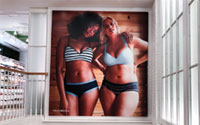 Headquarters: Pittsburgh, Pennsylvania
Year founded: 2006
Why it's revolutionary: Aerie is leading the charge in body-positive fashion advertising. In 2014, it swapped its airbrushed ads for unretouched photos and launched a campaign known as #AerieReal, which promoted natural beauty.
And it's working well. In December, its parent company American Eagle reported a 32% increase in same-store sales numbers at Aerie. Group CEO Jay Schottenstein described this as one of the company's best results ever in a call with investors after the earnings release, marking its 16th consecutive quarter of double-digit positive growth.
Kohl's is modernising department store shopping
Headquarters: Pittsburgh, Pennsylvania
Year founded: 2006
Why it's revolutionary: Aerie is leading the charge in body-positive fashion advertising. In 2014, it swapped its airbrushed ads for unretouched photos and launched a campaign known as #AerieReal, which promoted natural beauty.
And it's working well. In December, its parent company American Eagle reported a 32% increase in same-store sales numbers at Aerie. Group CEO Jay Schottenstein described this as one of the company's best results ever in a call with investors after the earnings release, marking its 16th consecutive quarter of double-digit positive growth.
Kohl's is modernising department store shopping
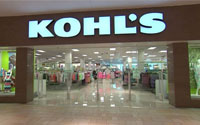 Headquarters: Menomonee Falls, Wisconsin
Year founded: 1962
Why it's revolutionary: Kohl's has been one of the few department stores to come out of the retail apocalypse unscathed, and analysts say this is partly due to the innovative changes it has brought to its stores. This includes a new partnership with Amazon to sell the e-commerce giant's devices in stores and offer a free returns service for products bought on Amazon at certain locations. CEO Michelle Gass said that the partnership is mutually beneficial: Kohl's has access to new customers, and Amazon gets access to physical locations.
Rent the Runway has made high fashion accessible
Headquarters: Menomonee Falls, Wisconsin
Year founded: 1962
Why it's revolutionary: Kohl's has been one of the few department stores to come out of the retail apocalypse unscathed, and analysts say this is partly due to the innovative changes it has brought to its stores. This includes a new partnership with Amazon to sell the e-commerce giant's devices in stores and offer a free returns service for products bought on Amazon at certain locations. CEO Michelle Gass said that the partnership is mutually beneficial: Kohl's has access to new customers, and Amazon gets access to physical locations.
Rent the Runway has made high fashion accessible
 Headquarters: New York, New York
Year founded: 2009
Why it's revolutionary: Rent the Runway is a fashion company that allows customers to rent clothing from more than 600 different designers, wear them, and then return them. Prices range from US$ 30 for a one-off rental to US$ 159 a month for an unlimited subscription. The company now has more than nine million members and is reported to be valued at around US$ 800 million. The company revealed that it now ships to 76% of zip codes in the US.
ThirdLove is customising bra shopping
Headquarters: New York, New York
Year founded: 2009
Why it's revolutionary: Rent the Runway is a fashion company that allows customers to rent clothing from more than 600 different designers, wear them, and then return them. Prices range from US$ 30 for a one-off rental to US$ 159 a month for an unlimited subscription. The company now has more than nine million members and is reported to be valued at around US$ 800 million. The company revealed that it now ships to 76% of zip codes in the US.
ThirdLove is customising bra shopping
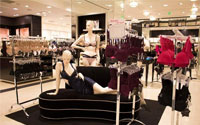 Headquarters: San Francisco, California
Year founded: 2013
Why it's revolutionary: Online bra retailer ThirdLove has made it possible to buy bras without having to go near a fitting room.
Shoppers are asked to complete a quiz to determine their perfect bra shape. ThirdLove then ships three bra styles out to the customer, who is then able to trial these styles for up to 30 days. Cofounder and co-CEO Heidi Zak said that more than 11 million women have taken the quiz, and that ThirdLove now has more than 600 million data points from this. The algorithm is getting smarter and smarter, she said.
ThredUP is bringing resale fashion into the mainstream
Headquarters: San Francisco, California
Year founded: 2013
Why it's revolutionary: Online bra retailer ThirdLove has made it possible to buy bras without having to go near a fitting room.
Shoppers are asked to complete a quiz to determine their perfect bra shape. ThirdLove then ships three bra styles out to the customer, who is then able to trial these styles for up to 30 days. Cofounder and co-CEO Heidi Zak said that more than 11 million women have taken the quiz, and that ThirdLove now has more than 600 million data points from this. The algorithm is getting smarter and smarter, she said.
ThredUP is bringing resale fashion into the mainstream
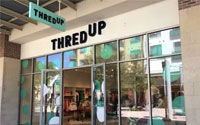 Headquarters: San Francisco, California
Year founded: 2009
Why it's revolutionary: Online thrift store ThredUp is leading the way in the second-hand buying-and-selling market. It's now the largest online second-hand store & has four stores in the US. Customers selling unwanted items are sent a "clean out bag," which they send back to ThredUp to decide what can be sold and what will be donated. The seller is either paid upfront or on consignment. Cofounder James Reinhart said that the store has 35,000 different brands and that fresh inventory and a wide selection are what keep customers coming back for more. In October, ThredUp launched UPcycle, a programme that enables customers to donate clothing and turn it into cash to spend at trendy brands such as Reformation.
Nike is changing the way we shop for sneakers
Headquarters: San Francisco, California
Year founded: 2009
Why it's revolutionary: Online thrift store ThredUp is leading the way in the second-hand buying-and-selling market. It's now the largest online second-hand store & has four stores in the US. Customers selling unwanted items are sent a "clean out bag," which they send back to ThredUp to decide what can be sold and what will be donated. The seller is either paid upfront or on consignment. Cofounder James Reinhart said that the store has 35,000 different brands and that fresh inventory and a wide selection are what keep customers coming back for more. In October, ThredUp launched UPcycle, a programme that enables customers to donate clothing and turn it into cash to spend at trendy brands such as Reformation.
Nike is changing the way we shop for sneakers
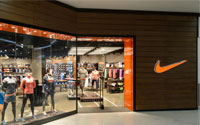 Headquarters: Beaverton, Oregon
Year founded: 1964
Why it's revolutionary: Nike launched its new scan-to-buy feature this year. This new service, which is accessed via the app, allows customers to scan the barcode of an item in the store and instantly purchase it.
Away is shaking up the luggage market
Headquarters: Beaverton, Oregon
Year founded: 1964
Why it's revolutionary: Nike launched its new scan-to-buy feature this year. This new service, which is accessed via the app, allows customers to scan the barcode of an item in the store and instantly purchase it.
Away is shaking up the luggage market
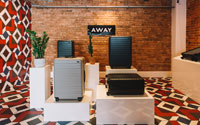 Headquarters: New York, New York
Year founded: 2015
Why it's revolutionary: Away wasn't the first company to invent smart luggage, but it has become a market leader. Its suitcases, which come in four sizes and cost between US$ 225 and US$ 295, come with a built-in charger. These suitcases have become the latest trendy item in travel. The company recently raised US$ 50 million in funding and now has eight stores in the US and UK.
Zola is eschewing tradition and allowing millennials to have cash wedding registries
Headquarters: New York, New York
Year founded: 2015
Why it's revolutionary: Away wasn't the first company to invent smart luggage, but it has become a market leader. Its suitcases, which come in four sizes and cost between US$ 225 and US$ 295, come with a built-in charger. These suitcases have become the latest trendy item in travel. The company recently raised US$ 50 million in funding and now has eight stores in the US and UK.
Zola is eschewing tradition and allowing millennials to have cash wedding registries
 Headquarters: New York, New York
Year founded: 2013
Why it's revolutionary: Zola is changing the wedding registry industry. The site offers couples the option to register for gifts and experiences such as vouchers for Airbnb or Hotels.com, or to simply ask their guests for cash to go towards their honeymoon or other big expenses.
It is fast becoming one of the leading disruptors in the market. In May, it announced that it had raised US$ 100 million in funding from investors that included NBC Universal and Goldman Sachs.
Headquarters: New York, New York
Year founded: 2013
Why it's revolutionary: Zola is changing the wedding registry industry. The site offers couples the option to register for gifts and experiences such as vouchers for Airbnb or Hotels.com, or to simply ask their guests for cash to go towards their honeymoon or other big expenses.
It is fast becoming one of the leading disruptors in the market. In May, it announced that it had raised US$ 100 million in funding from investors that included NBC Universal and Goldman Sachs.

Textile Excellence
If you wish to Subscribe to Textile Excellence Print Edition, kindly fill in the below form and we shall get back to you with details.












